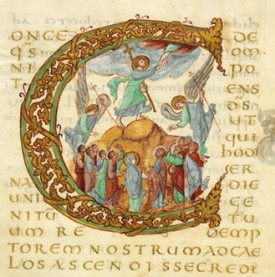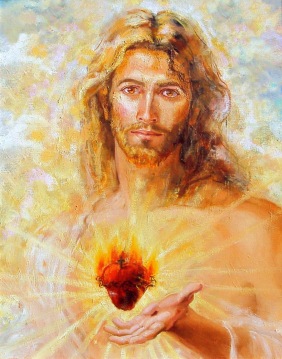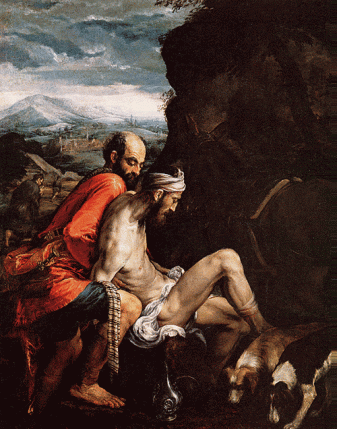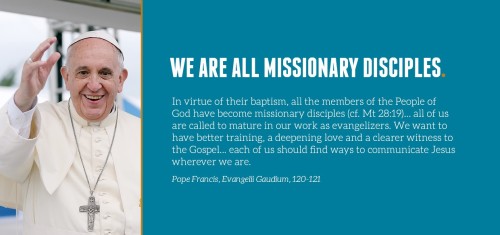Acts 1:1-11
Ps 47 R/. God has gone up with a shout, the Lord with the sound of a trumpet.
Eph 1:17-23
Mt 28:16-20

Illumination from the Drogon Missal (Metz), ca. 845-855.
We celebrate today the Solemnity of the Ascension of the Lord, the feast of the “the final act of our redemption” (JPII), whereby Christ returned to the Father to prepare a place for us (Jn 14:1-3). You see, the Ascension is really the culmination of the Incarnation. Jesus took up our flesh and our nature so that He might unite it to God. In the Ascension, Jesus brings that very nature and flesh into the presence of God for all eternity. In Baptism, we were joined to Christ, we were made members of His Body; that means, then, that Jesus brought us into Heaven with Him as He ascends to the Father. Think about that for a moment! Through Baptism, we already have a share, even now, of Heaven!
As we reflect on this great feast and mystery, I want to share with you some of Saint Pope John Paul II’s thoughts from a homily he gave for the Ascension (24 May 1979).
Reflecting on the readings associated with this feast, he found that “the richness of this mystery” can be summarized “in two statements: Jesus gave instructions, and then Jesus took his place” (JPII). I want to focus on the first statement, ‘Jesus gave instructions’.
* * *
In the days that followed the Resurrection, Jesus helped the Apostles to understand what had taken place over the first Holy Week, why He had to suffer and die, and what He had taught them.
Now, in His last moments on earth, Jesus commanded the Apostles to be [His] witnesses … to the ends of the earth (Acts 1:8), and to make disciples of all nations (Mt 28:19). Jesus gave them, and through them, the whole community of believers, the Church, the mission to share the Gospel, to evangelize the world. He instructs (commands) us to continue His mission!
But, as St. John Paul II wisely points out, “The instructions indicated, above all, that the Apostles were to wait for the Holy Spirit, who was the gift of the Father [cf. Acts 1:4]. From the beginning, it had to be crystal-clear that the source of the Apostles’ strength is the Holy Spirit. It is the Holy Spirit who guides the Church in the way of truth; the Gospel is to spread through the power of God, and not by means of human wisdom or strength” (JPII).
My brothers and sisters, our mission to share the Good News of Jesus Christ with the world is rooted not merely in our own encounter with Him and the joy that this relationship brings us, but more importantly, it’s rooted in the gift of the Holy Spirit, the Spirit that we received in Baptism and Confirmation.
It’s the Holy Spirit who gives us the zeal, the joy, the wisdom, the courage, the fidelity, and the words that we’ll need — when we need — to fulfill this mission of evangelisation, this mission of proclaiming Christ to the world. “Like Jesus, [we, too, are] to speak explicitly about the Kingdom of God and about salvation. [We, too, are] to give witness to Christ to the ends of the earth. The early Church clearly understood these instructions and the missionary era began” (JPII).
My brothers and sister, we — you and I, today! —, we need to rediscover this missionary era! This is what the Church means when she speaks of a time for a ‘new evangelisation’. We need once again to proclaim the Good News and salvation of Jesus Christ, each one of us!
But if we’re to do that, then it means that we ourselves first need to rediscover this beautiful gift. We ourselves first need to be renewed in the love and mercy of God, and re-strengthened with the gift of the Holy Spirit. And this isn’t an ‘optional’ part of being a disciple of Christ! If we truly believe what we profess by coming to Mass; if we truly believe what we say in the Creed; if we truly believe that Jesus is our Lord and God, and that He saves us by His Body and Blood, then we have a moral and religious obligation to share that salvation with others, because God wants all to be saved (1 Tim 2:3-4; cf. 2 Pet 3:9). We believe because we believe it to be true; so if it’s the truth, then how could we ever keep it to ourselves?! And so, with this command to preach the Gospel, Jesus shares His mission of saving the world with the Church, with each one of us who follow Him.

“The Ascension”, illumination from Les Très Riches Heures du duc de Berry, Folio 184r at the Musée Condé (Chantilly), ca. 1410.
That’s why it’s vital for each one of us to know Jesus, to know Him personally, and to always continue learning more about Him and about what He’s done for us. And there are really only three ways in which this knowledge of Jesus can be gained:
First, through prayer. We need to spend time with Jesus in order to get to know Him; we need to be with Him, to speak with Him, to listen to Him. A relationship can only be built through time and conversation, so if we’re to grow in our love and knowledge of Jesus, then we need make time to pray, every day.
Second, through Scripture. St. Jerome, the great Bible scholar once said, ‘Ignorance of Scripture is ignorance of Christ’. So if we’re to know who Jesus is and what He’s done for us, then we need to read the Bible. I recommend beginning with the New Testament, and then going back into the Old Testament for a deeper understanding. And since the Bible is the Word of God, reading it with prayer is a great way of discovering and listening to God’s voice.
Third, through the Saints. If prayer is conversation with Christ, and Scripture is His Word to speaking to us, then listening to what the Saints have to say about their life with Jesus is like talking with His family and friends. Our knowledge of Jesus and our intimacy with Him can grow tremendously through a dialogue with the Saints, by reading about their lives and experiences, and by feeding our prayer life with their spiritual writings.
And so these three things: prayer, Scripture and the Saints – these are the principal means of deepening our relationship with Jesus and strengthening our love for Him; these are the tools required for our mission of evangelization, for bearing faithful witness to who Jesus is and what He’s done for us. But of course, as St. John Paul II reminds us, all of this is rooted in the Holy Spirit working in our lives, giving us the grace to grow in faith, in love, in holiness, and increasing our capacity to be faithful and courageous witnesses in the world, for the world.
This is the vocation of the whole Church, not just of the clergy, but of all the baptised. “This is the mystery of the Ascension of [the Lord]. Let us always remember: Jesus gave instructions, and then Jesus took his place” (JPII). May we be faithful to that instruction, and so come to share in the place He has prepared for us. Amen.
 It’s been a while –– I’ve stopped writing our my homilies and recording them has been a bit challenging, so there hasn’t been much to post. I’ll work on it. In the meantime, I’ve added some other audio files.
It’s been a while –– I’ve stopped writing our my homilies and recording them has been a bit challenging, so there hasn’t been much to post. I’ll work on it. In the meantime, I’ve added some other audio files.


 And this is why now we celebrate this Sunday the mystery of the Most Holy Trinity,
And this is why now we celebrate this Sunday the mystery of the Most Holy Trinity,


